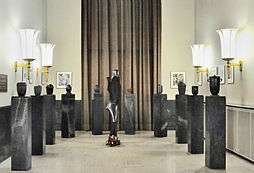National Resistance Museum, Luxembourg

The National Resistance Museum of Luxembourg (Musée national de la Résistance) is located in the centre of Esch-sur-Alzette in the south-east of the country. The specially designed building (1956) traces the history of Luxembourg from 1940 to 1945. There is also an exhibition of the Nazi concentration camps and the treatment of Luxembourg Jews.[1]
History
From the late 1940s, those involved in the resistance and political deportees began to plan a national resistance museum in order to preserve the memory of Luxembourg's victims of the Nazi occupation. A committee made up of the City of Esch-sur-Alzette, unions and representatives of resistance movements under the presidenc of Ed Barbel, undertook a fund-raising exercise which led to the opening of the Resistance Museum on 22 July 1956. The building had been designed by the architects Nicolas Schmit-Noesen and Laurent Schmit.
In 1984, the Minister of Culture, Robert Krieps, had the collection renewed and the museum renovated.[2] The museum re-opened in 1987, and through ministerial authority was now dubbed a "National" museum. Since 2008 Frank Schroeder, a former art teacher, manages the museum. [3]
The collection
The exhibition on the ground floor describes the fate of the Luxembourg people from the German invasion on 10 May 1940, the beginning of the Nazi regime, until the liberation in September 1944 with the arrival of the Americans or in January 1945 after the Battle of the Bulge. The first floor is devoted to artefacts from the concentration camps and the treatment of Luxembourg's Jews.
Works of art include the reliefs by Emile Hulten and Claus Cito outside the museum to sculptures by Lucien Wercollier and René Weyland inside. The large fresco by Foni Tissen and his canvas of the Hinzert concentration camp as well as Yvonne Useldinger's drawings of the Ravensbrück camp are also of note.[4]
Exhibitions

Since September 2009, temporary exhibitions have been displayed in the museum. Approximately every six months a new exhibition is shown:
- Lebensbilder, with oil paintings by Madeleine Weis-Bauler, a former resistance member and political deportee, from 4 September 2009 to 3 October 2009.
- Spott dem Naziregime - Karikaturen in Luxemburg vor, während und nach dem Krieg, the first exhibition produced by the museum itself, from 4 June 2010 to 5 September 2010
- Témoins / Zeugen, with photos by the Luxembourgish artist Tom Hermes, who portrayed contemporary witnesses, from 28 January 2011 to 1 May 2011.
- Kunst/KZ - Art/camps with works by the artists Yvonne Useldinger, Lily Unden, Lucien Wercollier, Edmond Goergen and Foni Tissen, from 6 May 2011 to 16 October 2011
- Peuple européen, peuple étranger - Le Luxembourg et les Roms, with photos by Patrick Galbats, from 10 February 2012 to 6 June 2012.
- Between Shade and Darkness - Le sort des Juifs du Luxembourg de 1940 à 1945, from 29 May to 24 November 2013
For May 2014, an exhibition on Nelson Mandela is planned.
Opening hours
The museum is open from Tuesday to Sunday, 2 pm to 6 pm. There is no admission charge. Groups can visit every day of the week from 8 am (free, appointment required). [5]
Bibliography
- Bernard Thomas, Bruchstellen - Chronik des Escher Resistenzmuseums ; in: forum, Nr. 299 (September 2010), pp. 12–18.
- Musée national de la Résistance, "Luxemburg im 2. Weltkrieg" ISBN 2-9599670-1-1
External links
- musee-resistance.lu (English) & (French)
References
- ↑ "Musée national de la Résistance à Esch-sur-Alzette", Centre de Documentation et de Recherche sur l'enrolement forcé. (French) Retrieved 20 February 2011.
- ↑ "Historique: Musée de la Résistance", Esch.lu. (French) Retrieved 20 February 2011.
- ↑ "Musée national de la Résistance à Esch-sur-Alzette", Centre de Documentation et de Recherche sur l'enrolement forcé. (French) Retrieved 8 November 2013.
- ↑ "Exposition permanente": Musée de la Résistance", Esch.lu. (French) Retrieved 20 February 2011.
- ↑ "Musée national de la Résistance à Esch-sur-Alzette", Centre de Documentation et de Recherche sur l'enrolement forcé. (French) Retrieved 8 November 2013.
Coordinates: 49°29′33″N 5°58′34″E / 49.4924°N 5.9760°E